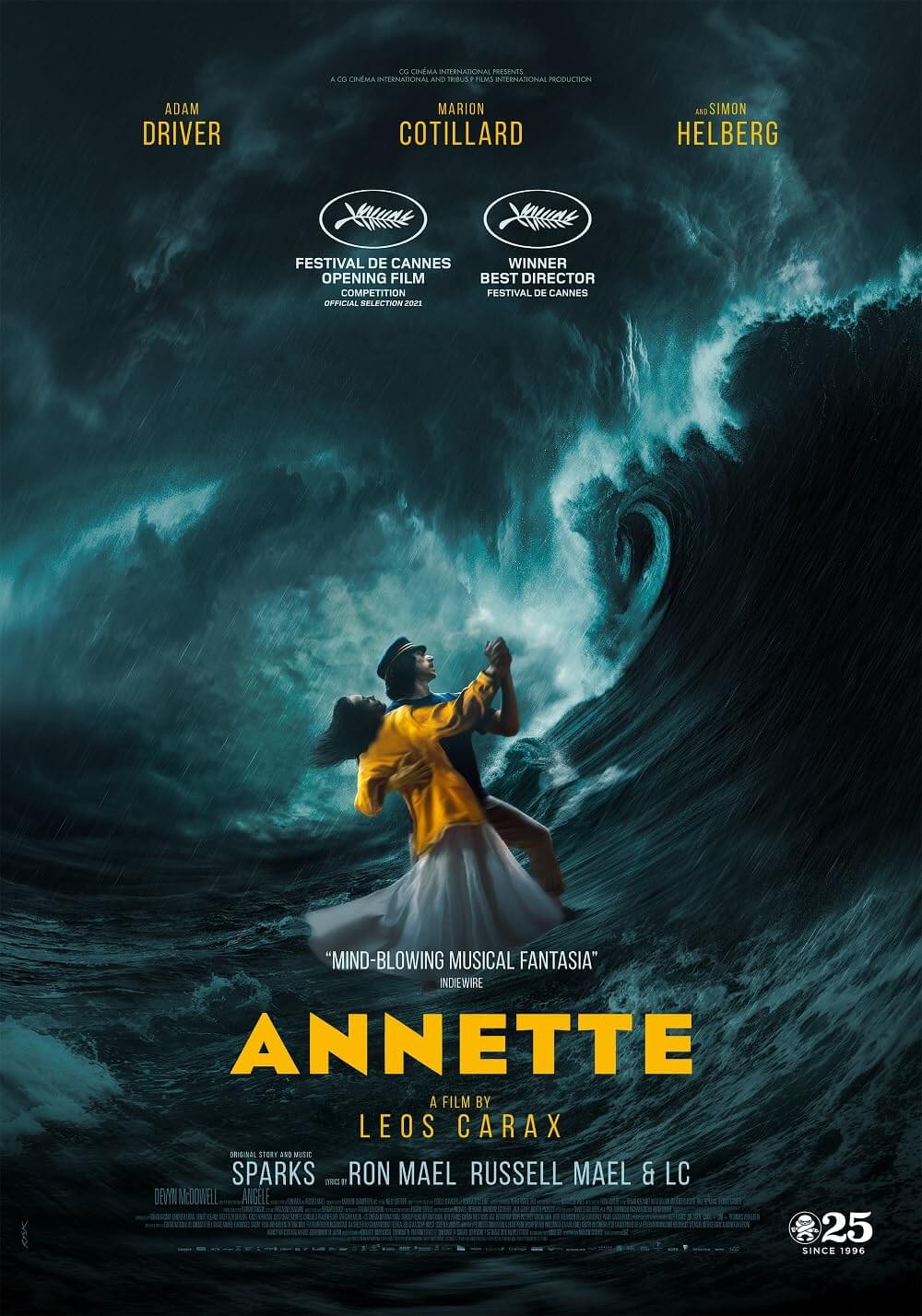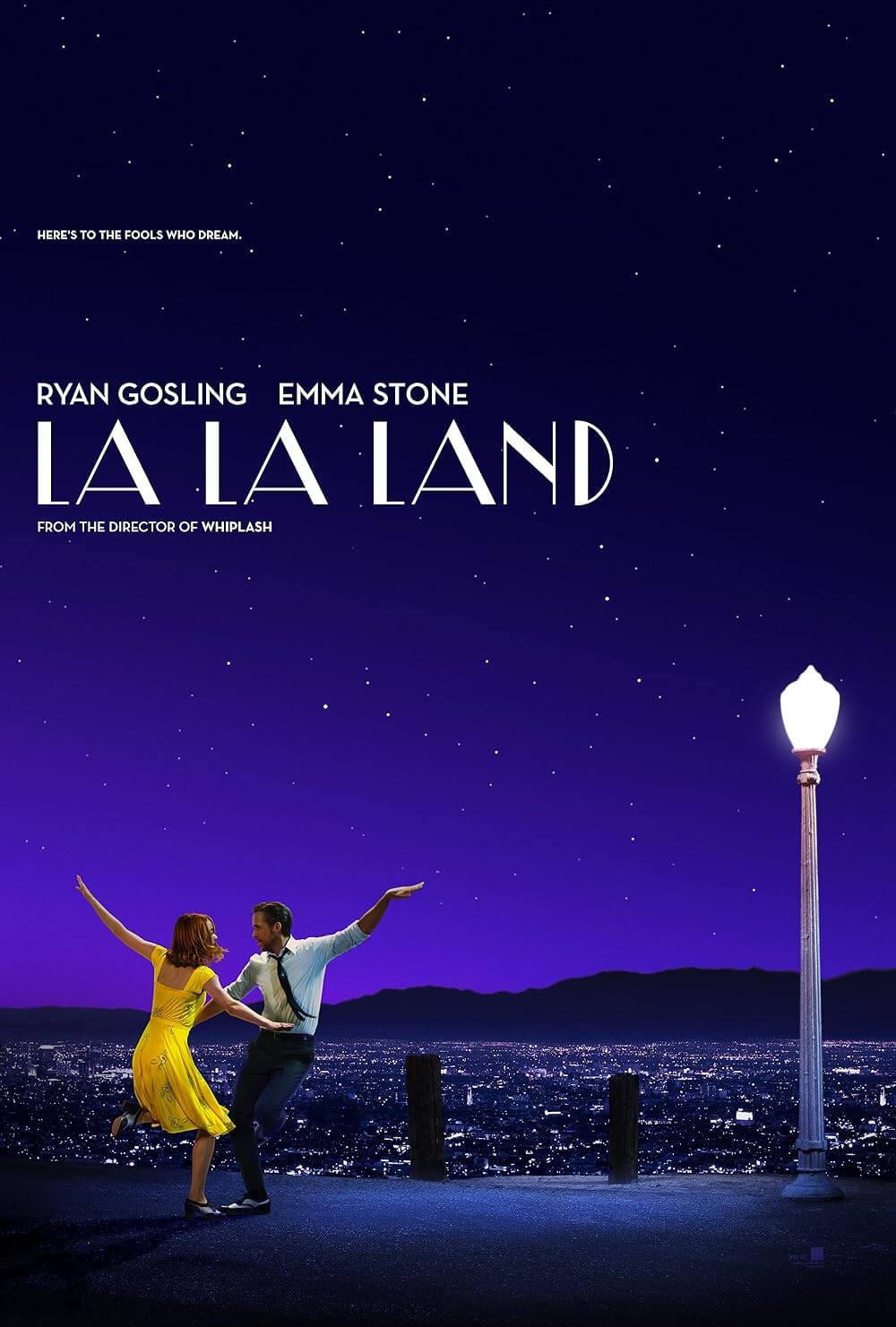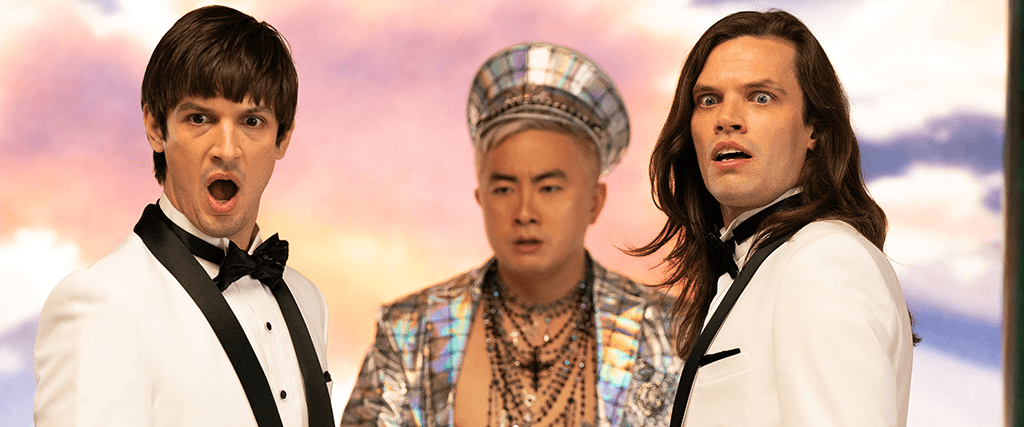
Dicks: The Musical
By Brian Eggert |
Moviegoers would have to explore the cinema of John Waters or Lloyd Kaufman to find something as gleefully transgressive as Dicks: The Musical, which is a statement meant with all earnestness and affection. Marketed as the first A24 musical, the Larry Charles-directed feature marshals filth and irony along with chunks of spat lunchmeat, big cock jokes, and scandalous sex—familiar territory for the subversive filmmaker behind Borat (2006) and Brüno (2009). Watching the film, you’re either busy laughing or asking, “Can they do that?” I suppose the answer is “Yes,” because they did. But it’s been so long since a comedy pushed the boundaries of conventional tastes, and really pushed them, that it feels almost strange to see—a familiar but distant sensation. Based on Aaron Jackson and Josh Sharp’s off-Broadway musical Fucking Identical Twins, the film opted not to reuse the original, spoilerly title. Understandable, since it probably wouldn’t go over well with theater chains or many viewers. Neither will the film. But if the descriptions so far pique your interest rather than cause you to recoil, then Dicks: The Musical might be your thing.
Jackson and Sharp adapted their two-person show, which premiered at the Upright Citizens Brigade in 2014, expanding the scope and adding at least one number. They reprise their roles as the title characters, Trevor and Craig, respectively, in a scenario drawn from The Parent Trap (1961, or if you prefer, 1998). Both hotshot salesmen with Patrick Bateman energy, in performances that project to the back row, Trevor and Craig discover they’re identical twin brothers who were separated at birth, though they look nothing alike. They resolve to switch places to learn about and then reunite their divorced parents, hoping to become one big happy family. A wrinkle: Their mother, Evelyn (Megan Mullally), is a senile recluse, content with her knick-knacks and loose grip on reality. Besides, her pussy fell off years ago (yes, you read that right). Another wrinkle: Their father, Harris (Nathan Lane), has come out as gay and spends his time caring for two “sewer boys”—freakish caged creatures he found in the tunnels beneath New York City. They survive on blood and lunchmeat and exist outside of linear time. So there’s that.
Doubtless, Dicks: The Musical will become a textbook example of the camp aesthetic, next to Pink Flamingos (1972) and But I’m a Cheerleader (1999), where nothing onscreen plays as straightforward—there’s always another layer to peel away, always a wink, always a subversive undertone (or, more frequently, an overtone), and always an over-the-top joke. From the outset, the film announces itself as written by two gay men, a detail that remains hilariously pointed as they “bravely” perform as promiscuous straight men, which is perhaps the most consistent and underlined irony in every scene. The closest the proceedings get to a modernist sensibility is the performance by Megan Thee Stallion, playing Trevor and Craig’s boss, Gloria, singing “Out Alpha the Alpha” in a genuinely feminist statement on how she claims power from the patriarchy. It’s such a break from the otherwise unserious proceedings that Bowen Yang’s God—the film’s bedazzled, fabulous narrator—has to usher us back to the surreal story.
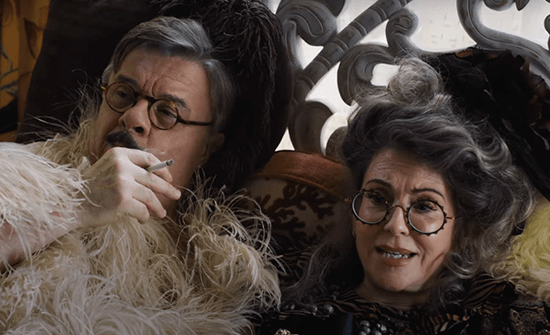 And yet, it’s easy to admire Charles’ commitment to the movie musical, with elaborately staged numbers and eye-popping colors. The production looks overlit, emphasizing the stage-to-screen musical quality, with scarcely credible sets and intentional artifice. A few cinematic devices, such as a split screen effect to show Trevor and Craig standing right next to each other, mock the medium; so does the vintage transitional B-roll footage that presents Dicks: The Musical as a classic New York story when it’s anything but. Elsewhere, the reappearance of Evelyn’s pussy made me think of a Deep Thought from SNL in the 1990s: “Anytime I see something screech across a room and latch onto someone’s neck, and the guy screams and tries to get it off, I have to laugh, because what IS that thing?!” Alas, it’s rendered with some silly looking CGI that circumvents so-bad-it’s-funny and lands in just plain bad territory, especially with its final, floating appearance that took the smile off my face.
And yet, it’s easy to admire Charles’ commitment to the movie musical, with elaborately staged numbers and eye-popping colors. The production looks overlit, emphasizing the stage-to-screen musical quality, with scarcely credible sets and intentional artifice. A few cinematic devices, such as a split screen effect to show Trevor and Craig standing right next to each other, mock the medium; so does the vintage transitional B-roll footage that presents Dicks: The Musical as a classic New York story when it’s anything but. Elsewhere, the reappearance of Evelyn’s pussy made me think of a Deep Thought from SNL in the 1990s: “Anytime I see something screech across a room and latch onto someone’s neck, and the guy screams and tries to get it off, I have to laugh, because what IS that thing?!” Alas, it’s rendered with some silly looking CGI that circumvents so-bad-it’s-funny and lands in just plain bad territory, especially with its final, floating appearance that took the smile off my face.
To be sure, Charles’ film isn’t perfect. The loose structure and constant irony make the 86-minute runtime feel longer than it is, while the main characters remain challenging to root for, if only because everything onscreen is so utterly absurdist. Even so, it’s commendable that Jackson and Sharp commit to the bit and resist any temptation to make their film about something—apart from an unbroken stream of meta jokes and bad-taste humor. It’s refreshing to see a movie that doesn’t attempt to soapbox, and that frames its final musical number by defending that “All love is love, all love is gross” against the most unlikely wedding ever. Every scene becomes another opportunity to insert a joke about private parts or bodily fluids, or place icons like Lane and Mullally in ridiculously funny and perverse situations. And its copious use of the queer F-word, which hasn’t been thoroughly owned since the last Buddy Cole monologue, is riotously brazen in an admirable way—a statement that applies to the whole movie.
Despite winning the People’s Choice Award for Midnight Madness at this year’s Toronto International Film Festival, Dicks: The Musical won’t be for everyone. Some viewers will flat-out despise the humor or feel worn down by its joke-machine quality. To the right of me was a couple laughing almost as much as I did; to the left of me, crickets, followed by a grim exit when the credits began to roll—they didn’t even stay for the hilarious outtakes over the end credits. (Watching Lane lose his composure over chewed ham might be my favorite comedy moment of 2023.) By the time the movie prompts a sing-along of some racy lyrics, you’re either tempted to join in or waiting for this thing to end already. Such divisive potency is missing from cinema today. Most studios and filmmakers are so afraid to piss people off that they avoid taking risks, especially in comedies. But what’s art without some productive infringement on the boundaries of so-called good taste?
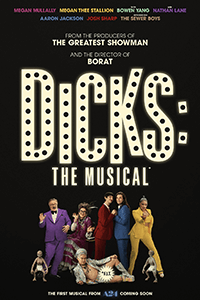
Unlock More from Deep Focus Review
To keep Deep Focus Review independent, I rely on the generous support of readers like you. By joining our Patreon community or making a one-time donation, you’ll help cover site maintenance and research materials so I can focus on creating more movie reviews and critical analysis. Patrons receive early access to reviews and essays, plus a closer connection to a community of fellow film lovers. If you value my work, please consider supporting DFR on Patreon or show your support in other ways.
Thank you for your readership!
Brian Eggert | Critic, Founder
Deep Focus Review



